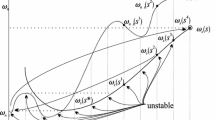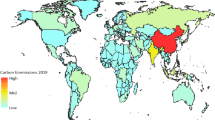Abstract
Environmental agreements represent voluntary coalitions which mostly regulate emissions and the exhaustion of natural resources. The analysis of why and under which conditions countries (or policy makers) may be inclined toward ratifying such agreements or not has been the focus of a body of theoretical work at the interface of environmental economics and the economics of coalition games. Traditional theoretical work predicted that environmental agreements are hard to sustain due to the lacking enforceability of associated contracts and the incentive to free-ride. This hypothesis is at odds with the enormous surge of such agreements in reality over the last few decades. Recent work by Rose and Spiegel (J. Money, Credit Bank. 41:337–363, 2009) suggests that environmental agreements will be signed and are stable, because they work as a signal and help economies to get access to export (and possibly other) credits. Hence, the reason for a ratification of such agreements is their interdependence with other policies, especially ones that are related to international business. This paper sheds light on the determinants of multilateral environmental agreement (MEA) participation. In particular, we pay attention to the role of a country’s international openness by means of chosen trade and investment policies for such participation. The results support the view that wealthier countries with a strong inclination towards trade and investment liberalization are more in favor of committing themselves voluntarily to environmental standards, pollution reduction, and other means of environmental protection through MEA memberships than other countries, all else equal.
Similar content being viewed by others
References
Altamirano-Cabrera, J.-C., & Finus, M. (2006). Permit trading and stability of international climate agreements. Journal of Applied Economics, IX, 19–47.
Anderson, J. E. (1979). A theoretical foundation for the gravity equation. American Economic Review, 69, 106–116.
Anderson, J. E., & van Wincoop, E. (2003). Gravity with gravitas: a solution to the border puzzle. American Economic Review, 93, 170–192.
Baier, S. L., & Bergstrand, J. H. (2007). Do free trade agreements actually increase members’ international trade? Journal of International Economics, 71, 72–95.
Baier, S. L., & Bergstrand, J. H. (2009). Estimating the effects of free trade agreements on international trade flows using matching econometrics. Journal of International Economics, 77, 63–76.
Barrett, S. (1994). Self-enforcing international environmental agreements. Oxford Economic Papers, 46, 878–894.
Barrett, S. (2001). International cooperation for sale. European Economic Review, 45, 1835–1850.
Barrett, S., & Stavins, R. (2003). Increasing participation and compliance in international climate change agreements. International Environmental Agreements: Politics, Law and Economics, 3, 349–376.
Beron, K. J., Murdoch, J. C., & Vijverberg, W. P. M. (2003). Why cooperate? Public goods, economic power, and the Montreal protocol. The Review of Economics and Statistics, 85, 286–297.
Blundell, R., Griffith, R., & Windmeijer, F. (2002). Individual effects and dynamics in count data models. Journal of Econometrics, 108, 113–131.
Bloch, F., & Gomes, A. (2006). Contracting with externalities and outside options. Journal of Economic Theory, 127, 172–201.
Breton, M., Sbragia, L., & Zaccour, G. (2008). Dynamic models for international environmental agreements. Fondazione Eni Enrico Mattei Nota di Lavoro, 33.2008.
Buchholz, W., Haupt, A., & Peters, W. (2005). International environmental agreements and strategic voting. Scandinavian Journal of Economics, 107, 175–195.
Cameron, A. C., & Trivedi, P. K. (2005). Microeconometrics: methods and applications. Cambridge: Cambridge University Press.
Caparrós, A., Hammoudi, A., & Tazdaït, T. (2004). On coalition formation with heterogeneous agents. Available at http://www.feem.it/Feem/Pub/Publications/WPapers/default.htm.
Carraro, C. (1998). Beyond Kyoto. A game-theoretic perspective. Paper prepared for the OECD workshop on “Climate Change and Economic Modelling. Background Analysis for the Kyoto Protocol”, Paris, 17–18 October.
Carraro, C., Eyckmans, J., & Finus, M. (2006). Optimal transfers and participation decisions in international environmental agreements. Review of International Organizations, 1, 379–396.
Carraro, C., Marchiori, C., & Sgobbi, A. (2005). Applications of negotiation theory to water issues Carlo. Available at http://ssrn.com/abstract=722362.
Center for International Earth Science Information Network (CIESIN) (2006). Data-base from Socioeconomic Data and Applications Center (SEDAC), Environmental Treaties and Resource Indicators. Available at http://sedac.ciesin.columbia.edu/entri/.
Chander, P., & Tulkens, H. (1992). Theoretical foundations of negotiations and cost sharing in transfrontier pollution problems. European Economic Review, 36, 388–398.
Congleton, R. D. (1992). Political institutions and pollution control. The Review of Economics and Statistics, 74, 412–421.
Davies, R. B., & Naughton, H. T. (2006). Cooperation in environmental policy: a spatial approach. University of Oregon Economics Department Working Papers, Eugene, OR 97403-1285.
Eyckmans, J., & Tulkens, H. (2003). Simulating coalitionally stable burden sharing agreements for the climate change problem. Resource and Energy Economics, 25, 299–327.
Feenstra, R. (2004). Advanced international trade: theory and evidence. Princeton: Princeton University Press.
Finus, M., & Rundshagen, B. (1998a). Renegotiation-proof equilibria in a global emission game when players are impatient. Environmental and Resource Economics, 12, 275–306.
Finus, M., & Rundshagen, B. (1998b). Toward a positive theory of coalition formation and endogenous instrumental choice in global pollution control. Public Choice, 96, 145–186.
Finus, M., van Ierland, E., & Dellink, R. (2006). Stability of climate coalitions in a cartel formation game. Economics of Governance, 7, 271–291.
Frankel, J. A., & Rose, A. K. (2002). Is trade good or bad for the environment? Sorting out the causality. NBER Working Papers 9201.
Greenpeace (2003a). How does the WTO affect you, and why should you care about it? Greenpeace.
Greenpeace (2003b). Why is the WTO a problem? Greenpeace.
Gwartney, J., Lawson, R., Sobel, R. S., & Leeson, P. T. (2007). Economic freedom of the world: 2007 annual report, Vancouver. The Fraser Institute. Data retrieved from http://www.freetheworld.com/.
Hall, A. R. (2005). Generalized method of moments. London: Oxford University Press.
Hansen, L. P., Heaton, J., & Yaron, A. (1996). Finite Sample Properties of some alternative GMM estimators obtained from financial market data. Journal of Business and Economic Statistics, 14, 262–280.
Hanyona, S. (2000). Zambia mercury submissions to UNEP. Earth Times News Service, November 28th.
Hochstetler, K. (2002). After the boomerang: environmental movements and politics in the La Plata River Basin. Global Environmental Politics, 2, 35–57.
Hochstetler, K. (2003). Fading green: environmental politics in the mercosur free trade agreement. Latin American Politics and Society, 45, 1–32.
Hoel, M. (1992). International environmental conventions: the case of uniform reductions of emissions. Environmental and Resource Economics, 2, 141–159.
Hoel, M., & Schneider, K. (1997). Incentives to participate in an international environmental agreement. Environmental and Resource Economics, 9, 153–170.
Lange, A., & Vogt, C. (2003). Cooperation in international environmental negotiations due to a preference for equity. Journal of Public Economics, 87, 2049–2067.
Lise, W., & Tol, R. S. J. (2004). Attainability of international environmental agreements as a social situation. International Environmental Agreements: Politics, Law and Economics, 4, 253–277.
Marshall, M. G., & Jaggers, K. (2007). Polity IV project: political regime characteristics and transitions, 1800–2006. Center for International Development and Conflict Management, University of Maryland.
Maddison, A. (2003). The world economy: historical statistics. Paris: OECD.
Mitchell, R. (2003). International environmental agreements: a survey of their features, formation and effects. Annual Review of Environment and Resources, 28, 429–461.
Mitchell, R. (2007). International environmental agreements database project. Version 2007.1, 2002–2007. Available at http://iea.uoregon.edu/.
Murdoch, J. C., & Sandler, T. (1997). The voluntary provision of a pure public good: the case of reduced CFC emissions and the Montreal protocol. Journal of Public Economics, 63, 331–349.
Murdoch, J. C., Sandler, T., & Vijverberg, P. M. (2003). The participation decision versus the level of participation in an environmental treaty: a spatial probit analysis. Journal of Public Economics, 87, 337–362.
Naghavi, E. (2005). Multilateral environmental agreements and trade obligations: a theoretical analysis of the Doha proposal. Fondazione Eni Enrico Nota di Lavoro, 52.2005.
Neumayer, E. (2002). Do democracies exhibit stronger international environmental commitment? A cross-country analysis. Journal of Peace Research, 39, 139–164.
Rose, A. K., & Spiegel, M. M. (2009). Non-economic engagement and international exchange: the case of environmental treaties. Journal of Money, Credit, and Banking, 41, 337–363.
Sugiyama, T., & Sinton, J. (2005). Orchestra of treaties: a future climate regime scenario with multiple treaties among like-minded countries. International Environmental Agreements: Politics, Law and Economics, 5, 65–88.
Swanson, T., & Mason, R. (2002). The impact of international environmental agreements: the case of the Montreal protocol. Fondazione Eni Enrico Mattei Nota di Lavoro, 81.2002.
Tobey, J. A. (1990). The effects of domestic environmental policies on patterns of world trade: an empirical test. Kyklos, 43, 191–209.
Tol, R. S. J. (1997). On the optimal control of carbon dioxide emissions: an application of FUND. Environmental Modeling and Assessment, 2, 151–163.
Tol, R. S. J. (2001). Climate coalitions in an integrated assessment model. Computational Economics, 18, 159–172.
UNCTAD (2007). World investment report—transnational corporations, extractive industries and development. In United Nations Conference on Trade and Development, New York and Geneva.
UNEP (2001). Multilateral environmental agreements: a summary. Background paper presented by the secretariat, United Nations Environment Programme, UNEP/IGM/1/INF/1, 30 March 2001. Available at http://www.unep.org/IEG/docs/working%20documents/MEA_summary/IGM-1-INF-1.doc.
United Nations Office of the High Representative for the Least Developed Countries, Landlocked Developing Countries and Small Island Developing States (UN-OHRLLS). Available at http://www.un.org/special-rep/ohrlls/ldc/list.htm.
van Beers, C., & van den Bergh, J. C. J. M. (1997). An empirical multi-country analysis of the impact of environmental regulations on foreign trade flows. Kyklos, 50, 29–46.
van Beers, C., & van den Bergh, J. C. J. M. (2000). The impact of environmental policy on foreign trade: tobey revisited with a bilateral flow model. Tinbergen Institute Discussion Papers, 069, 1–15.
Weikard, H.-P., Finus, M., & Altamirano-Cabrera, J.-C. (2006). The impact of surplus sharing on the stability of international climate agreements. Oxford Economic Papers, 58, 209–232.
Windmeijer, F. (2000). Moment conditions for fixed effects count data models with endogenous regressors. Economics Letters, 68, 21–24.
Windmeijer, F. (2002). ExpEnd, a Gauss programme for non-linear GMM estimation of EXPonential models with ENDogenous regressors for cross section and panel data. CEMMAP Working Paper CWP 14/02, The Institute for Fiscal Studies, Department of Economics, UCL.
Windmeijer, F. (2005). A finite sample correction for the variance of linear efficient two-step GMM estimators. Journal of Econometrics, 126, 25–51.
Windmeijer, F. (2008). GMM for panel count data models. In M. Laszlo & P. Sevestre (Eds.), The econometrics of panel data (3rd edn.). Berlin: Springer.
Windmeijer, F. A. G., & Santos Silva, J. M. (1997). Endogeneity in count data models: an application to demand for health care. Journal of Applied Econometrics, 12, 281–294.
Wooldridge, J. M. (1997). Multiplicative panel data models without the strict exogeneity assumption. Econometric Theory, 13, 667–678.
World Bank (2008). World Development Indicators. World Bank Group, Washington.
Author information
Authors and Affiliations
Corresponding author
Rights and permissions
About this article
Cite this article
Egger, P., Jeßberger, C. & Larch, M. Trade and investment liberalization as determinants of multilateral environmental agreement membership. Int Tax Public Finance 18, 605–633 (2011). https://doi.org/10.1007/s10797-011-9169-9
Published:
Issue Date:
DOI: https://doi.org/10.1007/s10797-011-9169-9




